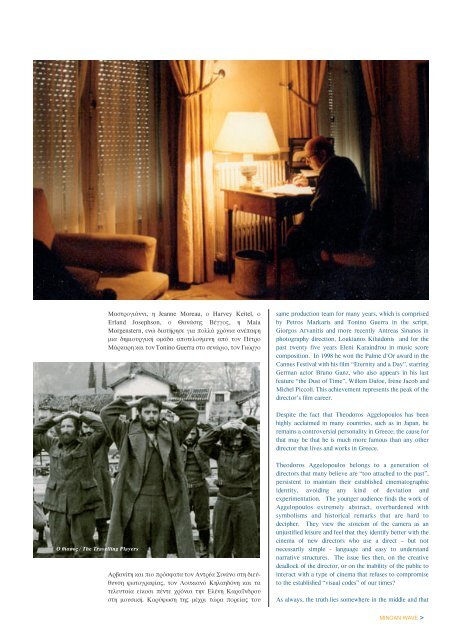Â˘Î¿‰· / Lefkada - Grimaldi Group
Â˘Î¿‰· / Lefkada - Grimaldi Group
Â˘Î¿‰· / Lefkada - Grimaldi Group
You also want an ePaper? Increase the reach of your titles
YUMPU automatically turns print PDFs into web optimized ePapers that Google loves.
ª·ÛÙÚÔÁÈ¿ÓÓÈ, Ë Jeanne Moreau, Ô Harvey Keitel, Ô<br />
Erland Josephson, Ô £·Ó¿Û˘ µ¤ÁÁÔ˜, Ë Maia<br />
Morgenstern, ÂÓÒ ‰È·Ù‹ÚËÛ ÁÈ· ÔÏÏ¿ ¯ÚfiÓÈ· ·Ó¤·ÊË<br />
ÌÈ· ‰ËÌÈÔ˘ÚÁÈ΋ ÔÌ¿‰· ·ÔÙÂÏÔ‡ÌÂÓË ·fi ÙÔÓ ¤ÙÚÔ<br />
ª¿ÚηÚË Î·È ÙÔÓ Tonino Guerra ÛÙÔ ÛÂÓ¿ÚÈÔ, ÙÔÓ °ÈÒÚÁÔ<br />
same production team for many years, which is comprised<br />
by Petros Markaris and Tonino Guerra in the script,<br />
Giorgos Arvanitis and more recently Antreas Sinanos in<br />
photography direction, Loukianos Kilaidonis and for the<br />
past twenty five years Eleni Karaindrou in music score<br />
composition. In 1998 he won the Palme d’Or award in the<br />
Cannes Festival with his film “Eternity and a Day”, starring<br />
German actor Bruno Ganz, who also appears in his last<br />
feature “the Dust of Time”, Willem Dafoe, Irène Jacob and<br />
Michel Piccoli. This achievement represents the peak of the<br />
director’s film career.<br />
Despite the fact that Theodoros Aggelopoulos has been<br />
highly acclaimed in many countries, such as in Japan, he<br />
remains a controversial personality in Greece; the cause for<br />
that may be that he is much more famous than any other<br />
director that lives and works in Greece.<br />
√ ı›·ÛÔ˜ / The Travelling Players<br />
∞Ú‚·Ó›ÙË Î·È ÈÔ ÚfiÛÊ·Ù· ÙÔÓ ∞ÓÙÚ¤· ÈÓ¿ÓÔ ÛÙË ‰È‡-<br />
ı˘ÓÛË ÊˆÙÔÁÚ·Ê›·˜, ÙÔÓ §Ô˘ÎÈ·Ófi ∫ËϷˉfiÓË Î·È Ù·<br />
ÙÂÏÂ˘Ù·›· ›ÎÔÛÈ ¤ÓÙ ¯ÚfiÓÈ· ÙËÓ ∂ϤÓË ∫·Ú·˝Ó‰ÚÔ˘<br />
ÛÙË ÌÔ˘ÛÈ΋. ∫ÔڇʈÛË Ù˘ ̤¯ÚÈ ÙÒÚ· ÔÚ›·˜ ÙÔ˘<br />
Theodoros Aggelopoulos belongs to a generation of<br />
directors that many believe are “too attached to the past”,<br />
persistent to maintain their established cinematographic<br />
identity, avoiding any kind of deviation and<br />
experimentation. The younger audience finds the work of<br />
Aggelopoulos extremely abstract, overburdened with<br />
symbolisms and historical remarks that are hard to<br />
decipher. They view the stoicism of the camera as an<br />
unjustified leisure and feel that they identify better with the<br />
cinema of new directors who use a direct – but not<br />
necessarily simple - language and easy to understand<br />
narrative structures. The issue lies then, on the creative<br />
deadlock of the director, or on the inability of the public to<br />
interact with a type of cinema that refuses to compromise<br />
to the established “visual codes” of our times?<br />
As always, the truth lies somewhere in the middle and that<br />
MINOAN WAVE >>
















